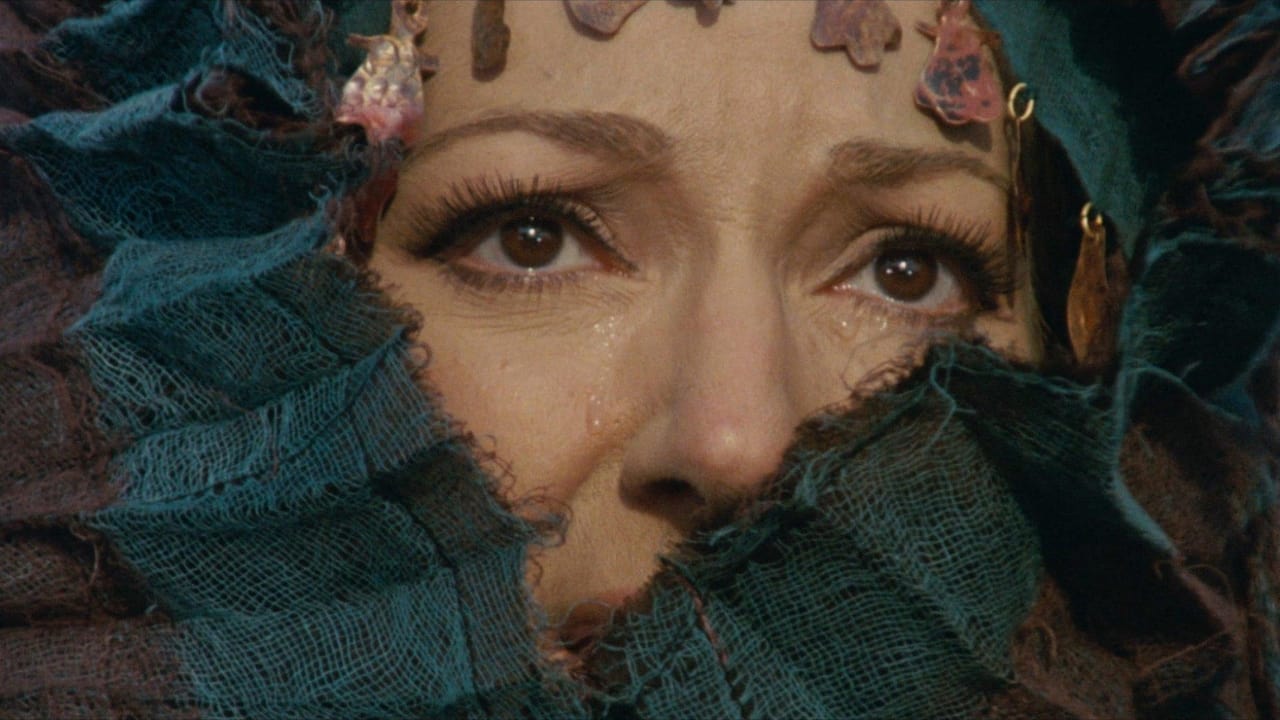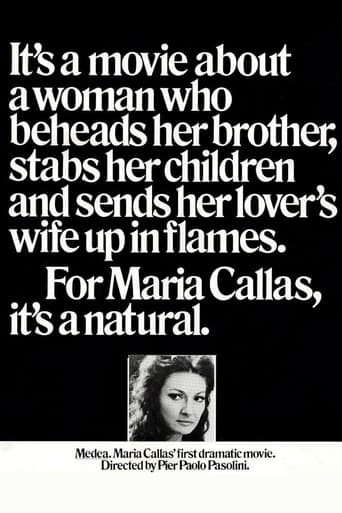

It is a performances centric movie
... View MoreAn absolute waste of money
... View MoreAbsolutely Fantastic
... View MoreThis movie tries so hard to be funny, yet it falls flat every time. Just another example of recycled ideas repackaged with women in an attempt to appeal to a certain audience.
... View MoreThe music... same as in the other two titles of Pasolini that I have seen. There was a boy playing an instrument all through the film. And this music ended the movie, with Medea going crazy.Something of the camerawork I remember is faces that were out of focus, sometimes men's faces would be blurred in the eyes of Medea. This can show a perspective, how she didn't see Jason clearly for who he was.The killing of children, although implied, wasn't shown. I think that makes it even more powerful, because in the last scene Medea, reversely, caresses her children, lovingly.We see a sense of loss of her identity, first of all, because Medea doesn't even seem to realize how she kills her children. If we truly are put in her head, than everything is very chaotic, all over the place, all over the time. Guided by the strange music that a boy with her sons plays. Sometimes Medea will drift off, and then as she wakes up, we find out she has done something horrible, but not us, nor Medea, had any idea.When the maids undress her from the black clothes and put white gown on her instead, making Medea look like them, there is a sense of repression. Now that I think about it, this sense of repression is present in other Pasolini films too.It is also about how the repression breaks into a revolt. In Porcile, the boy is eaten by pigs, a repression replaced with extreme violence. Something similar in Oedipus Rex, where Oedipus destroys his eyes with metal sticks. As if throwing all anger and fear into one final move of hands. And the same happens here. The entire town is burning, the children are dead, and Medea is in the middle of all this with a black dress. Her repressed self has come through.
... View More"Medea" reflects (some of) Pasolini's ideas about religion. He points out, accurately enough, that all religions we know today are successors to other, earlier religions. He also points out that religions interact : they fight, subvert, plagiarize, influence, nourish and transform each other. And quite often it's a case of "Plus ça change"... He expresses this concept by filling the movie with deliberate anachronisms : in Colchis, for instance, Medea and her family live in age-old dwellings, graven from the mountains, which at one time served as Christian churches or monk's cells. I can't say that everybody is going to appreciate these anachronisms but I for one did, I thought they resulted in a thought-provoking and artistically striking play of echoes and correspondences. So this is not a straightforward adaptation of Euripides' tragedy. For instance, much of the text goes out of the window ; indeed, bursts of speech or dialogue are few and far between. By the same token there is little in the way of classical classical costume. We, the viewers, are looking at the kind of ancient cultures - far older, even, than Euripides' own time period - whose practices, beliefs and rites may have inspired the various elements behind the Medea legend. The result is both familiar and vividly, dauntingly alien. Casting Maria Callas as the lead actress was a stroke of genius, since she possessed both majestic beauty and a general air of fierceness. One can well imagine such a woman taking sudden, sharp, cruel decisions and then executing them to the bitter end. (Watch out for the scene where the young Medea kills and then dismembers her brother : it's like watching a lioness systematically destroy her prey.) The actor playing Jason seemed inferior in talent, although he did succeed in capturing something of the infuriating opportunism and myopia of the character. An original, striking, electrifying work, but one that requires patient attention.
... View MoreFilm is barely a 100 years old, and strolls far behind Literature, which exists and shines for some 5000 years, and can't light a foot candle to music, which is probably a million years old...But, film is catching up, although the cannonball race that modern society is nowadays does more damage then good. 'Medea' is the prove that film can, or might, be art. In a gallant way.Pasolini's MEDEA deserves, on a scale from 1 to 10, a 1001.This film, even if the viewer MIGHT not be completely satisfied after watching this picture (rumour has it that there actually are 4 to 6 of them somewhere on our planet), will linger on in the mind forever. Gorgeous shots will come back over and over again, the enigmatic yet beautiful soundtrack combined with the breathtaking locations will prove to be unforgettable !Pasolini of course was a very wise man and leader, otherwise it is impossible one can surround himself with so much talent and craft. Having cinematographer Guarnieri, designer Ferretti and costume designer Tosi in your team means one knows that only the best were good enough.There are others though, the nameless of the production team must have done an impossible good job to get this movie shot in those sensational but extremely difficult places.And then of course, there is Callas.No no, you Filistines, La Divina is not singing here. Callas already ended her career as unparalleled Opera Diva when she shot this movie. She did use her bottomless brown eyes and enormous presence for MEDEA though.Many claim that MATTHEW'S PASSION is the ultimate PASOLINI Movie. They might be right; that one is as beautiful and as haunting as MEDEA.But MEDEA has the truly unique locations.And can boast that it has Maria Callas in her only movie-role...
... View MoreI love Pasolini, and Medea is easily the weakest of his works that I've seen. After having made the brilliant adaptation of the Greek tragedy Oedipus Rex, Medea seems rather uninspired. It retains most of Pasolini's beautiful settings, but the script is a poor adaptation of Euripides' play. The film's as slow as they come, and to me it seemed like a way to cover up the lack of ideas. Maria Callas is excellent as Medea, but she really doesn't have that much screen time, if you measure it. Most of the film is made up of people performing weird rituals, and the characters of Jason and Medea don't do all that much. I don't like Pasolini's interpretation of Jason as a chauvanist, egotistical jerk. It's too simplistic, and it's unfair moralizing from a modern vantage point. The character has much more depth in the various myths, even in Euripides' play. Medea's depth is sapped, as well, and her motivation in the film is sketchy at best. And then there are a couple of confusing ellipses, especially an extended fantasy sequence (apparently) where Medea imagines killing Glauce and Creon, followed by the reality. It feels more like there were two versions of this section, and the editor screwed up and left both in. Pasolini's direction is often amazing, as is the cinematography and music. I didn't hate Medea, but I can't muster any enthusiasm for it. 6/10.
... View More